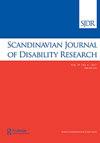Whose Voices Matter? Use, Misuse and Non-Use of Augmentative and Alternative Communication (AAC) Among Severely Disabled Children in Small Group Homes
IF 1.3
Q2 REHABILITATION
引用次数: 2
Abstract
The article explores whether and how severely disabled children living in small group homes are supported in their communicative efforts to participate and have a voice in their everyday lives. The study, framed within a human right’s perspective, is inspired by Merleau-Ponty’s phenomenology of the body. The empirical data material has been collected through a multi-method approach, including participant observation of everyday interactions between the children and staff in the group homes and semi-structured interviews with staff and parents. Our findings reveal that children and adolescents are communicative subjects who initiate different means to convey their messages and opinions. However, the staff appear to have little awareness and competence in communicative interactions and use of AAC, which have left the young residents marginalised and ignored. The discussion focuses on how the institutional context can support as well as impede on the children’s abilities to develop and employ their full range of communicative capabilities and exercise their human rights.谁的声音很重要?小组之家中重度残疾儿童使用、滥用和不使用增强和替代通信
这篇文章探讨了生活在小团体之家的严重残疾儿童是否以及如何在他们的交流努力中得到支持,以参与他们的日常生活并发出自己的声音。这项研究从人权的角度出发,受到梅洛-庞蒂身体现象学的启发。经验数据材料是通过多种方法收集的,包括参与观察儿童与集体之家工作人员之间的日常互动,以及与工作人员和家长进行半结构化访谈。我们的研究结果表明,儿童和青少年是交际主体,他们主动采取不同的方式来传达他们的信息和意见。然而,工作人员似乎缺乏沟通互动和使用AAC的意识和能力,这使得年轻的居民被边缘化和忽视。讨论的重点是体制环境如何能够支持和阻碍儿童发展和利用其全面交流能力和行使其人权的能力。
本文章由计算机程序翻译,如有差异,请以英文原文为准。
求助全文
约1分钟内获得全文
求助全文
来源期刊

Scandinavian Journal of Disability Research
REHABILITATION-
CiteScore
3.20
自引率
0.00%
发文量
13
审稿时长
16 weeks
 求助内容:
求助内容: 应助结果提醒方式:
应助结果提醒方式:


